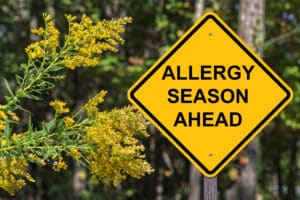 Spring is here and with the warm weather comes increased pollen counts that result in seasonal allergies. Seasonal allergies are very common with almost a third of the population affected by environmental allergies.Symptoms usually consist of itchy or watery eyes, runny nose with congestion, itchy sore throat, and sneezing. Sometimes postnasal drainage and cough are also part of the allergy picture. So what preventative measures can we take to minimize allergy symptoms and problems? The first step is to avoid extensive exposure to environmental allergens such as pollen. Avoid spending significant amount of time outdoors. If necessary, where sunglasses and an air filter mask. When returning indoors, taking a shower, washing your hair, and changing clothes are beneficial to preventing further exposure to allergens. Changing air filters on a regular basis and using vacuum cleaners with a high HEPA rating are also helpful. Mild to moderate allergies are frequently responsive to over-the-counter antihistamines and usually respond to intranasal steroid sprays such as Flonase or Nasacort, which are now over-the-counter. Use of saline nasal rinses such as Neil-med sinus rinse can be beneficial in washing dust and pollen out from the nasal and sinus cavities before they cause inflammation. If the allergy symptoms persist despite the preventative treatments and measures outlined above, you may require prescription medication or allergy testing to better manage symptoms. |
Schedule A Consultation
How Can We Help?
* All indicated fields must be completed.